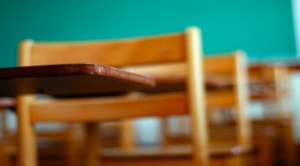By Jessamyn Dodd
(JNS) During recess at Alcott Elementary School in San Diego recently, Danielle Wisdom heard a child from a different class shout “Free Palestine.” The fourth-grade teacher, who is Jewish, questioned the child about the phrase and learned that the student’s mother uses it.
Wisdom has since become aware that many of the students at the school have unsupervised Internet access at home and are absorbing information from such sources.

“I want them to understand what the words mean and how they affect other people,” the aptly named Wisdom told JNS.
As a teacher, Wisdom approaches the situations that arise—particularly after Hamas’s Oct. 7 terrorist attacks on Israel—with curiosity about children’s thought processes. “Do they really feel this way, or are they parroting?” she said.
At school, she aims to foster an environment where all students can feel accepted, including those who have family in Israel or are concerned about what they are seeing on television or overhearing from adults.
“We hold a class meeting every week and do a restorative justice circle, coming together” as a group, she told JNS. “It provides an opportunity where anyone who has felt they have been hurt or misunderstood can call someone up to have a discussion.”
The school’s counselor also facilitates those meetings, helping the kids with healthy approaches to communication, Wisdom told JNS.
‘Let the kids take the lead’
A student approached her recently and asked: “Ms. Wisdom, did you know there is a war going on?” In such instances, Wisdom acknowledges the reality, admitting it can be intimidating, she told JNS.
She said that it’s often challenging to stay neutral and avoid letting her personal feelings about the war influence her discussions.
“I strive to let the kids take the lead,” Wisdom told JNS. “I have some extended family in Israel and have friends who live there. The effects have been emotional. We have generational trauma we carry as well.”
That trauma includes persecution and antisemitism, she stated, adding that “the reality is, being a teacher right now is hard.”
‘Districts not able to get a handle on this’
The website of the Jewish Federation of San Diego lists resources and tools for addressing antisemitism, intolerance and bias.
Heidi Gantwork, president and CEO of the Federation, told JNS that school districts have lost control of communal meetings, especially when they address courses at public schools that have become hot spots for disputes. (That includes those about ethnic studies, which are often steeped in antisemitic.)
“This is riling up parents. It got so bad that they had to ask everyone to leave,” Gantwerk told JNS. “The Jewish parents, the Palestinian parents.”
“The districts are not able to get a handle on this,” added Gantwerk, noting that school boards have added extra security at meetings.
A parent told the Federation that a Jewish child asked a San Diego public-school world history teacher if the instructor could talk about what’s happening in Israel. The teacher allegedly replied: “We can talk about it, but just so you know, I’m not on your side,” Gantwerk told JNS.
Among Jewish teens at California public schools, “anxiety levels are high right now,” Wisdom said. “This is a difficult time to be a Jewish teen.”
While public schools worry about rising antisemitism, Jewish schools are more concerned about issues surrounding safety and security, according to Gantwerk, posing an oft-thought question: “Will there be an attack?”
*
Preceding provided by JNS.org